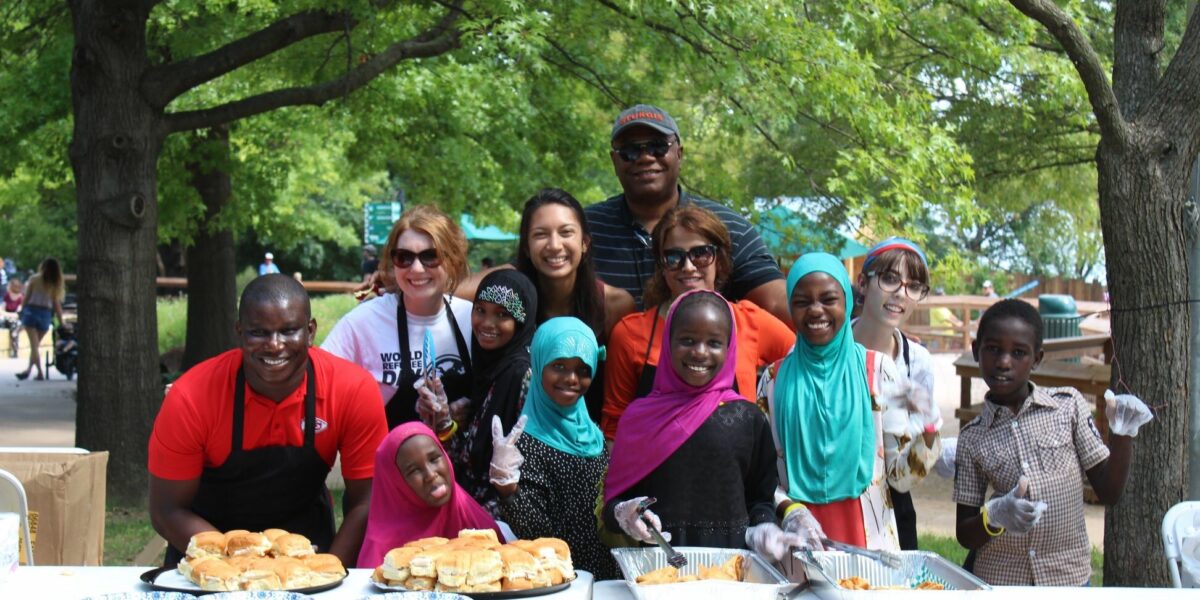Several weeks into my year of Mennonite Voluntary Service (MVS), my pastor, Ruth, preached about faith as "a brush with the divine." I grasped eagerly at that idea and have held onto it tenaciously ever since. I was always taught, per the book of Hebrews and the teachings of Thomas Aquinas, that faith was "the substance of what is hoped for, the evidence of things not seen." Perhaps these two characterizations of faith are consistent with one another, but I identify more with Ruth’s wording. Isn’t it always the real-world confrontations, the situations, words, or run-ins with people that stir up a religious feeling in me – not the unseen? On a daily basis, I get to work with individuals who have fled persecution and embody astounding resilience. Faith frequently seems like a lump in the throat, blinking back tears, or a punch in the gut – a nudge or jolt, as much as a brush, with the divine.
And yet, I struggle with the specifics of faith. As a Catholic working for a Jewish refugee resettlement organization through MVS, I have fingered and tugged at the boundary lines between these religious belief systems as I shuttle between church, work, and home. For the most part, I see these boundary lines as arbitrary categories in my mind. And yet, perhaps because of the comfort that compartmentalization provides, the lines remain.
Sometimes I worry: Are these categories barriers to faith? When I sense the boundary lines become tense and taut – when I leave Rainbow Mennonite Church early to go to a Catholic mass that has yet to "wow" me as Pastor Ruth’s sermons do, or when I shrug off the Jewish identity of my workplace because I don’t fully understand it – I chide myself later for doing a disservice to one of my chosen communities.
Last Wednesday, I slid down my icy Kansas City street to Rainbow Mennonite for choir dinner and rehearsal. After a substantial meal of hearty potato soup and zwieback (a German Mennonite yeast roll that I encountered for the first time), we gathered in a circle in the sanctuary to rehearse our anthem for Sunday. As usual, the 30 of us started by sight-reading the hymn in four-part harmony. I’ll play into religious stereotypes here and admit that this harmonic feat never ceases to amaze me – a full Catholic church can barely eek out the melody line. This week, however, I was immediately captivated, not just by the performance, but also by the anthem itself.
True evangelical faith cannot lie sleeping, for it clothes the naked, it comforts the sorrowful, it gives to the hungry food, and it shelters the destitute.
It was a prayer written by Menno Simons in the 16th century and set to music by the Canadian Mennonite composer, Larry Nickel. We were to sing this anthem for Mennonite World Fellowship Sunday, a time to remember the common roots and worldwide faith community of Anabaptist-related churches across the globe.
It cares for the blind and lame, the widow and orphan child – that’s true evangelical faith. It binds up the wounded heart; it offers a gentle hand. We must become everything God ordains.
The words of this song hit me hard, a gut-punch of the divine. True to form, I felt a lump come to my throat that made it hard to sing the soprano. This prayer, like Ruth’s words, redefined faith in a way that I could understand. Furthermore, it reclaimed evangelism as service to the poorest and most vulnerable.
I am sure that Menno Simons’ words resonated with me because they described a brush with that which is most present to me this year: my work at Jewish Vocational Service, accompanying refugee individuals through their first three months in the United States. My daily tasks hardly seem as holy or straightforward as clothing the naked, comforting the sorrowful, and feeding the hungry – what Catholics would call the corporal works of mercy. Fielding complaints about late food stamps, purging grimy clothes from the donation closet, and applying for Medicaid and cash assistance are hardly divine work. But the individuals I encounter and the faith they inspire – these are truly divine and evangelical.
Two days after rehearsing this song, I sat with a man who was applying for Supplemental Security Income, helping him fill out additional paperwork for Disability Determinations. Since coming to the United States, he had held jobs as a dishwasher at a casino and a factory-line worker at a chicken-processing plant. Only his stately mannerisms and kind smile still hinted at his true life’s work. He had been a bishop in charge of 10 congregations in Burundi – overseeing priests; traveling to preach at baptisms, weddings, and funerals; and planting churches around the country.
I did what little I could, assuring him I would fax the papers right away and be in touch if I learned more. Still, I felt helpless, wishing I could promise him a positive outcome. "God bless you, my sister," he told me in Kinyarwanda when I expressed this. "I know I was doing God’s work. I have faith that I will do God’s work again." Perhaps my client was expressing the faith of things unseen. But through his words, I experienced another brush with the divine.
Abundantly we have received and gratefully we will respond with true evangelical faith. So, overcome evil with good, return someone’s hatred with love. We must become everything God ordains.
May we experience a brush with the divine when we do so.








